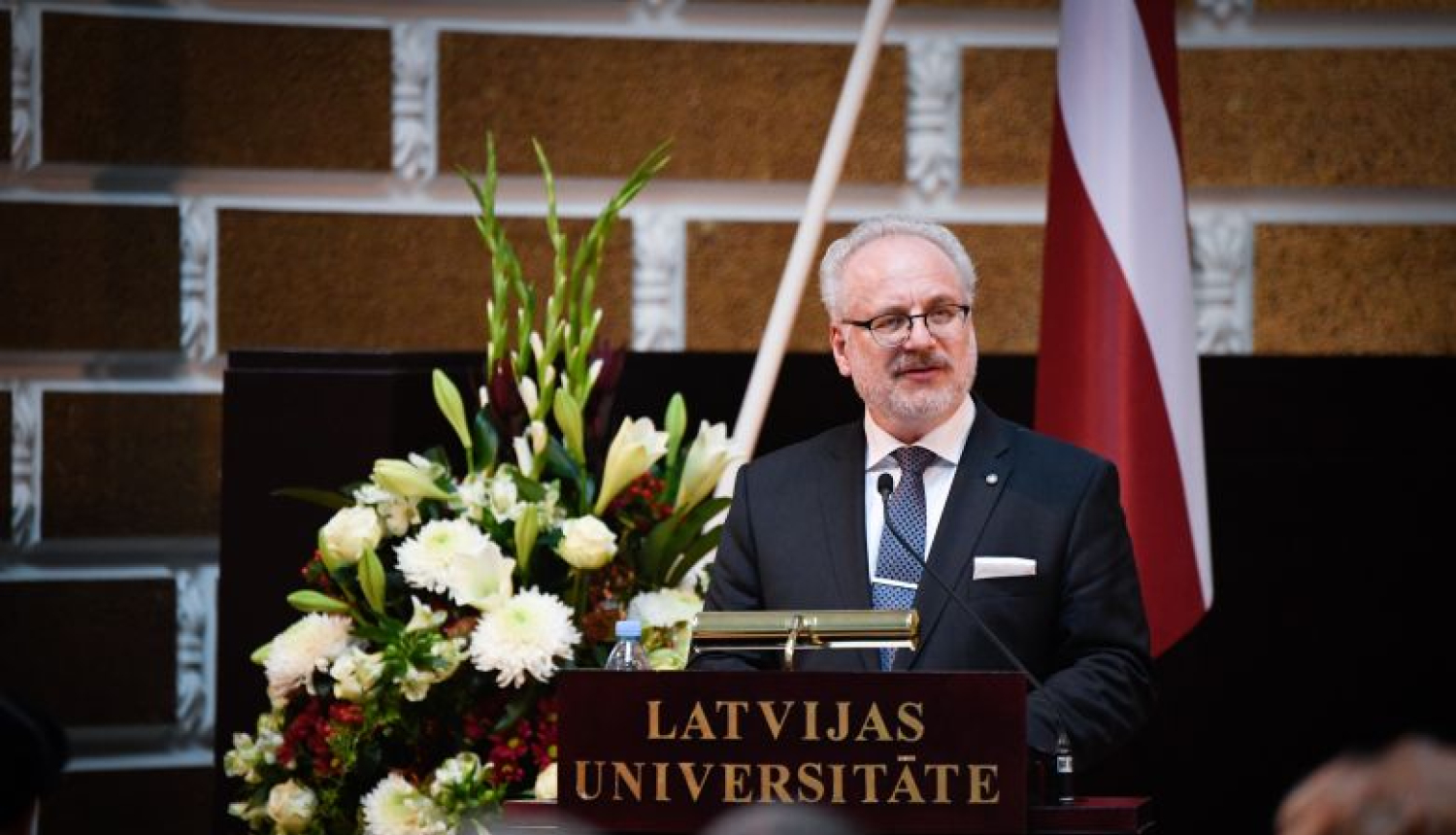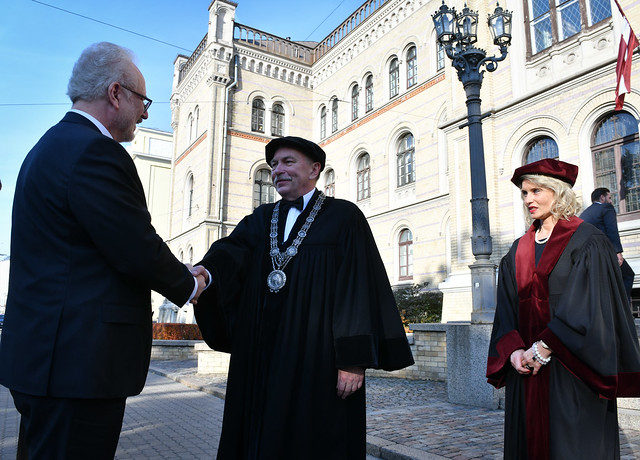Dear leadership of Faculty of Law, professors and members of the legal community,
Dear ladies and gentlemen,
On behalf of a Friend of the Faculty of Law, an honorary title bestowed upon me, I would like to congratulate all of you on this big day!
I
University of Latvia Faculty of Law has always had, still has and will continue to have a special mission of maintaining Latvia’s legal system which is one of the cornerstones of our democracy.
II
All legal systems are built upon law universities, their values and traditions. Research and academic work of university staff and future lawyers consolidates Latvian legal theory and our state.
Faculty plays an invaluable role in educating judges, civil servants and politicians. It creates our national elite. Lawyers represent the part of our society capable of demonstrating particular sense of responsibility and duty required to ensure the sustainability and integrity of our democracy, as well as establish the rule of law as the fundamental core principle of our Satversme (Constitution) and the whole legal system.
III
Lawyers of democratic Latvia must be totally loyal to our country and our legal system. All our lawyers work within national framework and can either strengthen or weaken our country.
100 years ago, when the Faculty of Law was founded by our predecessors, such values and loyalty were a given. Lawyers must be loyal to the state. Such values and loyalty may not apply to other professions, for example, other academic disciplines or carpenters. Lawyers change along with the state.
And we feel grateful to these outstanding and highly patriotic individuals, the founders of the Faculty of Law, to this day. They continue to be our inspiration. They built our state out of nothing. They built the Faculty of Law and our legal system from scratch.
IV
Previous speakers already mentioned Čakste and others. I think they continue to be role models of law students and professors of the Faculty to this day.
V
All legal systems mirror their national political systems. It would be absolutely naïve to think that the legal system is isolated from politics, that it is ‘immune’ to politics.
It is quite the contrary, legal systems have nowadays become a key extension of the political systems because in modern democracies political aim of preserving statehood, national identity, democracy and rule of law are achieved through law. And our democracy is still quite young.
VI
50-year long period when Faculty of Law educated and honed the skills of Soviet lawyers was not so long ago. Legal system began its long, evolutionary transformation when the political system created by the Soviet occupational regime instantly collapsed under the third wave of awakening. This revolution completely dismantled the previous political system, and a new legal system began to evolve. Reconstruction of the legal system is always hard and slow. It requires knowledge and skill, whereas a revolution requires will and courage.
VII
West and the Soviet bloc had different relationship with justice. That is why after the restoration of independence our civil service and lawyers had to get acquainted with Western jurisprudence, which represents the theoretical body of the legal systems, before they learned how to transfer legal methodologies from West. This transition required them to learn by doing, and 10-12 years later the transformation of the legal system was complete or at least could be considered complete because formally this transition ended with Latvia's accession to the European Union in 2004 when our legal system became a part of the legal system established by the EU. This transformation was largely facilitated by the Faculty of Law.
Although the overhaul of legal system is formally complete, legal culture, which is an even broader and more vague notion, is still developing, and creation of new legal culture takes even more time than the reconstruction of legal system. So, there is legal system revolution, legal system transformation and legal culture. Legal culture is what we are still building. If we take an honest look at it, there are some elements in our current legal culture that we have inherited from the Soviet legal culture and even the legal culture of Russian Empire. Although our legal system is new and modern, this 'legacy' is still hindering the development of fully efficient legal system that serves its purpose.
IX
Where are we now?
Generally speaking, our legal system operates the same way as those of the other EU member states. However, we can also see that Latvia's democracy would benefit from greater respect of the rule of law and more efficient law enforcement agencies. It is a matter of our legal culture, legislation. Legal culture can mostly be enhanced through high-level legal education and legislation would come next. I am talking about legal education that is not limited to those 5 years one spends in university. It includes also the continuing education, lifelong learning. Lawyers also need lifelong learning.
X
Modern legal science, at least the legal science created by the Faculty of Law of the University of Latvia, is integrated with the European legal science. Where can we find the evidence of that? In references. Reference reflect the legal space in which Latvian legal science is integrated in and from which we draw findings and new ideas. 15 years ago those references used by legal scholars were mostly to Russian or former Soviet research, whereas now our references are mostly linked to EU legal space and the legal space of the whole Western world. Latvian legal science has been gradually integrated into Western legal science, specifically its continental European legal science branch.
However, there is also the question of whether legal science is one of those disciplines that belongs primarily to national level. There are natural sciences, for example, mathematics and physics, there is no Latvian mathematics, and there are also human sciences, legal science that are more nationally oriented. These sciences should, therefore, be viewed differently. We cannot directly evaluate and compare them based on international rankings and citability. These nationally oriented disciplines need to be viewed differently from natural sciences. To excel at natural sciences, you need to be integrated in global scientific processes. Excellence in natural sciences can be measured based on rankings and number of publications, but legal science should be measured differently. We must continue work on defining criteria for the assessment of the role of legal science in the reference system. I will urge the Faculty of Law to form a working group that would develop criteria for the assessment of the quality of Latvian legal science. We must find clear indicators and criteria for such quality assessment system.
XI
Let me underline that legal science is an integral part of law. Law is composed of several elements and the core element of the law is legal idea. There usually are no clear or written definitions of legal ideas. In modern countries these legal ideas that are not clearly defined or written down are gradually transformed into written laws or other legislative acts. However, a legislative act is not a law, legislative act is only a representation of legal idea. Legal science refines the legal ideas described by legislative acts. By interpreting legal norms, legal science identifies the space between the legal texts. Legal science puts legal texts into broader perspective, defines their purpose and meaning. Our legal culture has a problem with that. It has problems with giving meaningful context to legal texts, with defining and formulating the elements of legal texts. I would like to urge our legal science experts to pay greater attention to development of appropriate methodologies.
XII
Dear colleagues,
Legal system cannot operate efficiently without stand-alone legal science. Therefore, legal science plays a strategic role in ensuring the efficiency of Latvia's legal system. We must make sure that legal science can operate and develop in such stand-alone mode. It can be achieved through publications, legal magazines, research and monographs. In addition to the strategic role of legal science in ensuring the efficiency of national laws and the functioning of the state, these considerations should be taken into account when making financial decisions with regarding the funding of further development of legal science.
Dear colleagues,
As a Friend of the Faculty of Law, I thank you and congratulate you on your anniversary. I wish you to enjoy tonight’s celebration.
Thank you!





